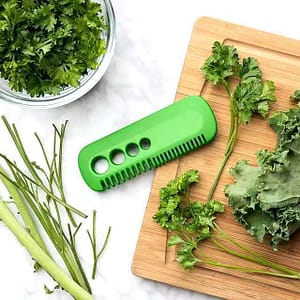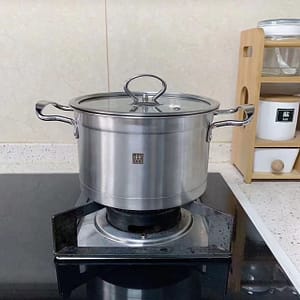
Blog Details

Is Your Cooking Oil Raising Cholesterol?
You’re diligent about your diet. You’re reading labels, choosing lean proteins, and loading up on vegetables. Yet, despite your best efforts, your cholesterol numbers aren’t quite where you want them to be.
What if a silent saboteur is hiding in plain sight, not in the food you buy, but in the way you prepare it?
The unexpected kitchen “item” that could be secretly raising your cholesterol isn’t a gadget or a specific ingredient you’d immediately suspect. It’s the overheated, repeatedly reused, or poorly stored cooking oil in your pan.
While fresh, high-quality cooking oils can be part of a healthy diet, their transformation under improper cooking conditions can generate harmful compounds that negatively impact your heart health.
The Hidden Danger: Oxidized & Trans Fats
When cooking oils are heated past their smoke point (the temperature at which they start to smoke and break down), or when they are reused multiple times, they undergo chemical changes.
This process, called oxidation, creates harmful substances like oxidized fatty acids and, more significantly, potentially increases the formation of trans fats.
- Oxidized Fats: These are damaged fats that can contribute to inflammation and oxidative stress in the body. They can also make LDL (bad) cholesterol more prone to accumulating in arterial walls.
- Trans Fats: These are notorious for being the worst type of fat for your cholesterol. They not only raise your LDL (bad) cholesterol but also lower your HDL (good) cholesterol, a double whammy for heart health. While artificial trans fats have been largely banned from processed foods, they can still form in your kitchen when oils are improperly handled, especially during deep-frying or repeated heating.
Why This Is More Common Than You Think:
Many home cooks, aiming to be economical or simply unaware of the risks, might:
- Reuse Frying Oil: Draining oil from a fryer or pan and saving it for the next meal.
- Overheat Oils: Using oils with low smoke points (like extra virgin olive oil) for high-heat searing or frying.
- Improper Storage: Storing oils in clear bottles in direct sunlight or near the stove, causing them to oxidize even before use.
How to Ditch This Cholesterol Culprit & Protect Your Heart:
The good news is that preventing this silent sabotage is straightforward and involves simple adjustments to your cooking habits.
-
Know Your Oil’s Smoke Point: Different oils tolerate different heat levels.
- High Heat (Frying, Searing): Avocado oil (very high smoke point), refined olive oil, grapeseed oil, peanut oil.
- Medium Heat (Sautéing, Roasting): Extra virgin olive oil, regular olive oil, coconut oil.
- Low Heat/Dressings: Flaxseed oil, walnut oil.
- Using the right oil for the right temperature is key. A good stainless steel frying pan or cast iron skillet can help you control temperatures more effectively than thinner pans.
-
Avoid Reusing Cooking Oil (Especially for Frying): This is perhaps the most crucial step. While a quick sauté in a pan might leave minimal residue, repeatedly straining and reusing oil, particularly from deep-frying, significantly increases the formation of harmful compounds. After one or two uses, especially if the oil has darkened or smells off, it’s time to properly dispose of it.
-
Store Oils Properly: Light, heat, and air are enemies of oil stability.
- Store oils in dark, airtight bottles away from direct sunlight and heat sources (like above the stove).
- Consider refrigerating delicate oils like flaxseed oil to prevent rancidity.
- Ensure your oil dispensers are opaque and seal tightly.
-
Embrace Alternative Cooking Methods: Reduce your reliance on high-heat frying. Explore methods like:
- Baking and Roasting: Often require less oil and lower, more controlled temperatures.
- Steaming: Uses no oil and retains nutrients.
- Air Frying: Uses minimal oil for a crispy result.
-
Choose Stable Oils: Opt for oils that are more resistant to oxidation, such as monounsaturated fats (olive oil, avocado oil) and saturated fats (coconut oil, ghee) for cooking. While polyunsaturated fats (like sunflower, corn, or soybean oil) have health benefits, they are more prone to oxidation when heated repeatedly.
By understanding the subtle ways cooking oil can transform and impact your health, you’re empowered to make smarter choices. Ditching the habit of overusing or overheating cooking oil is a simple, yet powerful step towards a healthier heart and a more vital you.
Related Reading:
- “Are You Making These 5 Common Cooking Mistakes That Are Silently Harming Your Health?“ (Link to previous blog on cooking habits)
FAQs About Cooking Oil and Cholesterol
Q1: What is an oil’s smoke point, and why is it important?
A1: The smoke point is the temperature at which an oil begins to smoke continuously and break down. Heating oil beyond its smoke point creates harmful compounds, including trans fats and free radicals, which can negatively impact cholesterol and overall health.
Q2: Can reusing cooking oil really create trans fats?
A2: Yes. While the primary source of trans fats is industrial hydrogenation, repeatedly heating and reusing cooking oil at high temperatures, especially unsaturated oils, can cause them to break down and form small amounts of trans fats and other undesirable compounds.
Q3: Which cooking oils are best for high-heat cooking like frying?
A3: For high-heat cooking, opt for oils with high smoke points, such as avocado oil (one of the highest), refined olive oil, grapeseed oil, or peanut oil. Extra virgin olive oil is better for lower heat sautéing or finishing dishes.
Q4: How should I dispose of used cooking oil?
A4: Never pour used cooking oil down the drain, as it can clog pipes. Allow it to cool completely, then pour it into a non-recyclable container (like an old milk carton or plastic bottle) and discard it in your regular trash. Some communities also have recycling programs for cooking oil.
Q5: Does the type of pan I use affect how stable my cooking oil is?
A5: While the oil itself is the primary factor, a good quality pan that distributes heat evenly (like a thick-bottomed stainless steel, cast iron, or ceramic pan) can help prevent hot spots that might cause the oil to smoke prematurely in certain areas. Avoid thin, easily overheated pans for high-heat cooking.
Our Products
-
Sweettreats Non-stick Copper Skillet
$30.49 – $55.44 Select options This product has multiple variants. The options may be chosen on the product page -
Vegetable Leaf Peeler Vegetable Peeler Mini
$7.55 Select options This product has multiple variants. The options may be chosen on the product page -
Double Same Style Stainless Steel Stock Pot Steamer
$64.52 Select options This product has multiple variants. The options may be chosen on the product page -
Stainless Steel Colander Noodle Dumplings Mesh Basket
$27.73 – $32.26 Select options This product has multiple variants. The options may be chosen on the product page -
3 In 1 Multifunctional Rotary Paring Knife
$9.27 – $31.01 Select options This product has multiple variants. The options may be chosen on the product page -
Watermelon Cutting Artifact
$7.83 – $8.38 Select options This product has multiple variants. The options may be chosen on the product page
Products
-
Sweettreats Non-stick Copper Skillet
$30.49 – $55.44 Select options This product has multiple variants. The options may be chosen on the product page -
Vegetable Leaf Peeler Vegetable Peeler Mini
$7.55 Select options This product has multiple variants. The options may be chosen on the product page -
Double Same Style Stainless Steel Stock Pot Steamer
$64.52 Select options This product has multiple variants. The options may be chosen on the product page -
Stainless Steel Colander Noodle Dumplings Mesh Basket
$27.73 – $32.26 Select options This product has multiple variants. The options may be chosen on the product page









